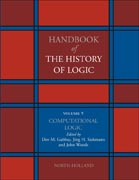
Handbook of the History of Logic brings to the development of logic the best in modern techniques of historical and interpretative scholarship. Computational logic was born in the twentieth century and evolved in close symbiosis with the advent of the first electronic computers and the growing importance of computer science, informatics and artificial intelligence. With more than ten thousand people working in research and development of logic and logic-related methods, with several dozen international conferences and several times as many workshops addressing the growing richness and diversity of the field, and with the foundational role and importance these methods now assume in mathematics, computer science, artificial intelligence, cognitive science, linguistics, law and many engineering fields where logic-related techniques are used inter alia to state and settle correctness issues, the field has diversified in ways that even the pure logicians working in the early decades of the twentieth century could have hardly anticipated. Logical calculi, which capture an important aspect of human thought, are now amenable to investigation with mathematical rigour and computational support and fertilized the early dreams of mechanised reasoning: Calculemus?. The Dartmouth Conference in 1956 - generally considered as the birthplace of artificial intelligence - raised explicitly the hopes for the new possibilities that the advent of electronic computing machinery offered: logical statements could now be executed on a machine with all the far-reaching consequences that ultimately led to logic programming, deduction systems for mathematics and engineering, logical design and verification of computer software and hardware, deductive databases and software synthesis as well as logical techniques for analysis in the field of mechanical engineering. This volume covers some of the main subareas of computational logic and its applications. Chapters by leading authorities in the fieldProvides a forum where philosophers and scientists interactComprehensive reference source on the history of logic INDICE: INTRODUCTION 1. Computational Logic, Jörg Siekmann 2. Logic and the Development of the Computer, Martin Davis GENERAL 3. The Evolution of Logic Following its Interaction with Computer Science and AI, Dov Gabbay AUTOMATED REASONING 4. Automated Deduction, Alan Bundy, Jörg Siekmann 5. Interactive Theorem Proving, John R. Harrison, Frederik Wiedijk, Josef Urban 6. Automation of Higher Order Logic, Christoph Benzmüller, Dale Miller 7. Mechanization of Type Theory, Gilles Dowek, Herman Geuvers 8. Equational Logics and Rewriting, Claude Kirchner, Helene Kirchner 9. Possibility Theory and Reasoning in Artificial Intelligence, Didier Dubois, Henri Prade 10. Computerizing Mathematical Text, Fairouz Kamareddine, J.B. Wells, Christoph Zengler and Henk Barendregt SPECIFICATION and VERIFICATION 11. Temporal Logics and Model Checking for Verification, Edmund M. Clarke 12. Logical Synthesis of Reactive Systems - from Alonzo Church to Modern Applications, Bernd Finkbeiner 13. Concurrency Theory: The Origins of Coinduction and Process Algebras, Jos Baeten, Davide Sangiorgi COMPUTER SCIENCE 14. Degrees of Unsolvability, Klaus Ambos-Spies, Peter A. Fejer 15. Computational Complexity, Lance Fortnow, Steven Homer 16. Logic Programming, Bob Kowalski 17. Logic and Databases, Jack Minker, Dietmar Seipel, Carlo Zaniolo 18. Logic and Multi Agent Systems, John-Jules Meyer 19. Description Logics, Matthias Knorr, Pascal Hitzler 20. Logics for the Semantic Web, Pascal Hitzler, Jens Lehmann, Axel Polleres
- ISBN: 978-0-444-51624-4
- Editorial: North Holland
- Encuadernacion: Cartoné
- Fecha Publicación: 01/09/2014
- Nº Volúmenes: 1
- Idioma: Inglés
